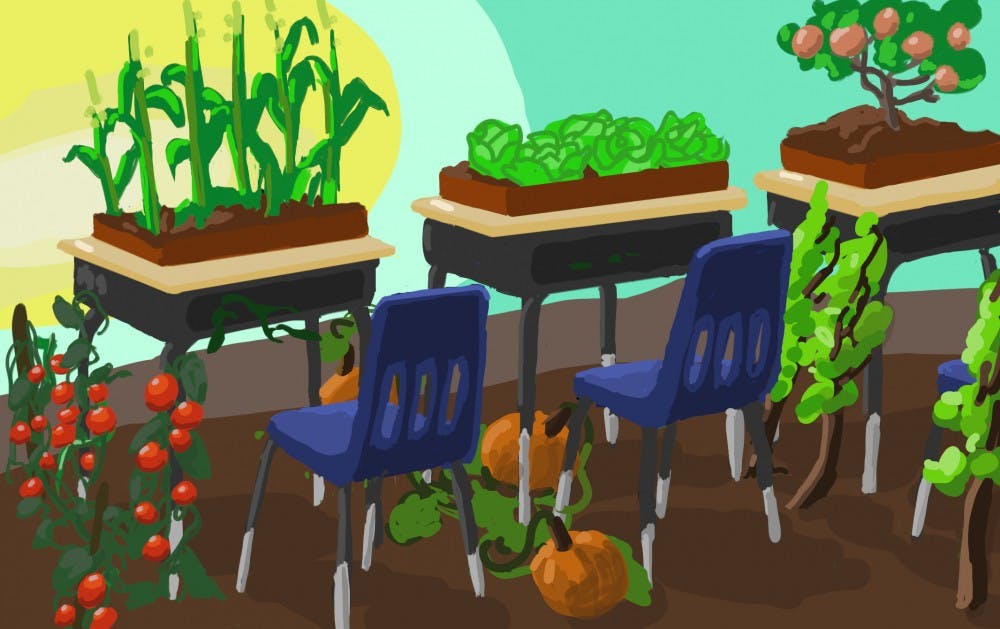ASU and Mesa Community College will be creating a course that aims to introduce students to various opportunities within agriculture with the help of a $682,313 grant from the U.S. Department of Agriculture.
The course, which will start in the spring of 2020, is meant to teach students agriculture research techniques and help students understand the agriculture industry as a whole, said Rebecca Muenich, assistant professor at the School of Sustainable Engineering and the Built Environment and the lead project investigator for the new class.
The new class will also include students from MCC, and Muenich said that the school is a "perfect fit" to collaborate with on the project because they “already have a program in sustainable agriculture, where students get to grow their own food in the urban farm.”
Peter Conden, program director of MCC's Sustainable Agriculture program, said that as part of the USDA grant, MCC is building a new greenhouse as part of a complex that includes an indoor vertical farm unit, which is a "fancy name for growing vegetables indoors under lights."
Conden said all of the students in the program will be able to use the new complex.
“We’re developing controlled environmental agriculture courses so students can grow traditional hydroponic crops in the greenhouse,” Conden said.
On Oct. 10-11, an event called "Identifying Emerging Opportunities for Arizona Agriculture” took place on the MCC campus to connect the agricultural community to the stakeholders to expand upon current agricultural research.
Stakeholders, faculty at ASU, MCC and other local community colleges, as well as USDA scientists, were brought together to identify new opportunities for agriculture specifically in Maricopa County, Muenich said.
Muenich said this grant and collaboration can help solve Maricopa County's problems of limited areas to cultivate crops and its limited water supply.
“Some might think that’s looking bad for agriculture, but I think that’s where opportunity comes in — the opportunity for innovation," Muenich said. "I think that with ASU partnering with their (MCC's) sustainable agriculture program and USDA’s Arid Land Agricultural Research Center, we can really start to address some of these problems and think about how agriculture can have a future in Arizona.”
This Urban Agriculture project has other ASU programs it can eventually collaborate with, such as the new Swette Center for Sustainable Food Systems, which launched just a year ago.
"It's pretty good timing because the new Swette Program started, and you can get specific master's degrees and undergraduate degrees," Muenich said.
The new Swette Center, with regards to agriculture specifically, focuses on whether farmland is going to be sustainable and productive over the next 20 years, according to Kathleen Merrigan, executive director of the Swette Center and former deputy secretary of the USDA.
Merrigan said they have to question the impact agriculture has on biodiversity, water, human health and rural community viability.
Besides the courses beginning in the spring of 2020, the Urban Agriculture project's grant will provide students with a research project and opportunity for an internship through the USDA.
“By the end of the semester all the students will have contributed to a research project idea and then those students will be eligible to get an internship through the USDA over the summer to implement their research project,” said Muenich.
One possible landing spot for these students is the Arid Land Agricultural Research Center, which has a research farm that will be available to be used by students throughout the course to work on their research project.
Muenich additionally wants students to recognize how most fields offered at ASU can apply to agriculture with a little thought.
“The scale of agriculture is such that you can make a tremendous impact on anything from climate change to water resources to energy," she said. "So I always tell students that if you’re working in the agricultural sector, you have such a good opportunity to make an impact on the world.”
Reach the reporter at baharr21@asu.edu or follow @bharris823 on Twitter.
Like The State Press on Facebook and follow @statepress on Twitter.




